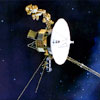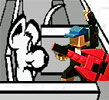In popular culture, space is often presented as a silent realm (eg that famous tag line from the Alien movie posters). And certainly to us, with our limited Earth-bound sense of hearing, it would “sound” that way. But to someone with the right sort of ears, space would be a very noisy place indeed; one filled with whistling planets, roaring particulate space winds, and basso profundo black holes that emit some of the deepest tones in the universe.
Luckily, through the instruments of deep space exploration and radio telescopy, we have acquired these “ears” and, in recent years, the extraterrestrial sound world they have opened up has become readily available on the web. Two of the more notable online repositories for these sounds from space are those curated by Stephen McGreevy and Don Gurnett.
 McGreevy’s site is the more lo-tech, Earth-bound of the two, and focuses on sounds from the Earth’s own magnetosphere, which he records using a VLF radio receiver that he has been carting around to isolated locales like Northern Manitoba and the Mojave Desert. Technically speaking, a lot of his more recent recording are not “space sounds” as they record sonic phenomena produced by atmospheric events like lightning strikes, but his earlier recordings concentrate on the sounds produced by the aurora borealis, which is itself a product of the solar winds bombarding Earth’s atmosphere.
McGreevy’s site is the more lo-tech, Earth-bound of the two, and focuses on sounds from the Earth’s own magnetosphere, which he records using a VLF radio receiver that he has been carting around to isolated locales like Northern Manitoba and the Mojave Desert. Technically speaking, a lot of his more recent recording are not “space sounds” as they record sonic phenomena produced by atmospheric events like lightning strikes, but his earlier recordings concentrate on the sounds produced by the aurora borealis, which is itself a product of the solar winds bombarding Earth’s atmosphere.
 In contrast, Don Gurnett's archives are devoted primarily to sounds from deep space probes such Cassini and the Voyagers. Included in his archive are sounds emanating from Jupiter, Saturn, and probably the most significant extraterrestrial field recording of recent times – the sound of Voyager 1 crossing the termination shock. The termination shock occurs at a place far out in space where the stream of solar particles emanating from the sun are brought to a standstill by the buffeting of interstellar winds. So effectively, it is the sound of Voyager leaving our solar system. Unfortunately, its only six seconds long and fairly unspectacular, but still pretty monumental stuff.
In contrast, Don Gurnett's archives are devoted primarily to sounds from deep space probes such Cassini and the Voyagers. Included in his archive are sounds emanating from Jupiter, Saturn, and probably the most significant extraterrestrial field recording of recent times – the sound of Voyager 1 crossing the termination shock. The termination shock occurs at a place far out in space where the stream of solar particles emanating from the sun are brought to a standstill by the buffeting of interstellar winds. So effectively, it is the sound of Voyager leaving our solar system. Unfortunately, its only six seconds long and fairly unspectacular, but still pretty monumental stuff.
 This comes from a high school science project on a Franciscan monk science web-site, so it must be true... (Stop laughing!)
This comes from a high school science project on a Franciscan monk science web-site, so it must be true... (Stop laughing!)
Apparently, some kid in Virginia took two groups of mice and subjected one to 10 hours of classical music per day, and the other to 10 hours of hard rock per day. Both groups of mice were routinely sent through a maze and it was found that after 3 weeks, the classical music mice had cut their maze navigation time down by 85%. The times for the hard rock mice meanwhile had gone up by a dazed and confused 100%!...
The experiment would have gone on longer but unfortunately... all the hard rock mice killed each other.